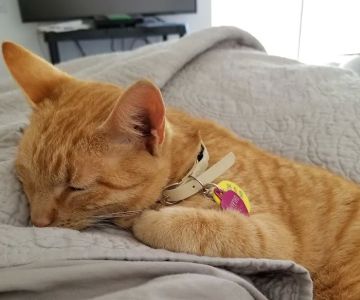- 1-Understanding-the-Challenge-of-Overweight-Cats
- 2-Key-Nutritional-Needs-for-Overweight-Cats
- 3-Exploring-the-Best-Diets-for-Overweight-Cats
- 4-Implementing-Diet-Strategies-with-Expert-Advice
- 5-How-Hidden-Brook-Veterinary-Supports-Cat-Weight-Management
1. Understanding the Challenge of Overweight Cats
Overweight cats face numerous health risks, including diabetes, arthritis, and decreased life expectancy. Identifying that your cat is overweight is the first step toward a healthier future. Unlike humans, cats cannot express their discomfort clearly, so recognizing subtle signs—like reduced activity or difficulty grooming—is vital.
Weight gain in cats often results from a combination of overfeeding, inactivity, and sometimes underlying medical conditions. Therefore, addressing the issue requires more than just reducing food; it demands a carefully structured approach tailored to feline physiology.

3809 N Armenia Ave, Tampa, FL 33607, USA
See Details1.1 Why Weight Management Matters
Maintaining an optimal weight enhances your cat’s quality of life by improving mobility, preventing disease, and increasing longevity. It also reduces veterinary costs associated with treating obesity-related illnesses.
2. Key Nutritional Needs for Overweight Cats
When selecting diets for overweight cats, understanding their unique nutritional needs is essential to ensure weight loss without compromising health.
2.1 Protein-Focused Diets
Cats are obligate carnivores, meaning their diets must be rich in high-quality protein to maintain muscle mass during weight loss. Protein also promotes satiety, helping cats feel fuller longer.
2.2 Controlled Fat and Carbohydrates
Limiting fat and carbohydrates reduces calorie intake, but these nutrients must not be eliminated entirely. A balanced approach prevents nutritional deficiencies and supports metabolic health.
2.3 Essential Vitamins and Minerals
Even during calorie restriction, cats require sufficient vitamins and minerals for overall well-being, immune function, and energy.
3. Exploring the Best Diets for Overweight Cats
Choosing the best diets for overweight cats involves evaluating commercial and homemade options, considering palatability, nutritional completeness, and ease of portion control.
3.1 Prescription Weight Loss Diets
Veterinary-approved prescription diets are specifically formulated to support feline weight loss through calorie control and nutrient balance. These diets often include ingredients that promote lean muscle retention and fat metabolism.
3.2 High-Protein, Low-Carb Commercial Diets
Several over-the-counter brands offer high-protein, low-carbohydrate options that can help reduce weight while satisfying your cat’s dietary needs. These diets mimic a cat’s natural eating habits more closely.
3.3 Homemade and Raw Diets
Some owners prefer preparing homemade meals or raw diets, focusing on lean proteins and limited carbs. However, this requires careful planning to avoid nutritional gaps. Consulting with a veterinary nutritionist is advisable before starting such regimens.
3.4 Case Example: Bella’s Transformation
Bella, a 7-year-old domestic shorthair, struggled with obesity after her owner inadvertently overfed treats. By transitioning to a veterinary-prescribed weight management diet and increasing interactive playtime, Bella lost 15% of her body weight over six months. This improvement was accompanied by increased energy and a shinier coat, demonstrating how the best diets for overweight cats combined with lifestyle changes lead to real success.
4. Implementing Diet Strategies with Expert Advice
Effective weight loss for cats is not simply about changing food but managing portions, feeding schedules, and physical activity.
4.1 Portion Control and Scheduled Feeding
Free feeding often contributes to overeating. Measured meals provided at regular intervals help regulate calorie intake and establish routine.
4.2 Encouraging Physical Activity
Interactive toys, climbing structures, and regular playtime increase calorie expenditure. Even modest activity can make a significant difference in weight management.
4.3 Monitoring Progress and Adjusting Plans
Regular veterinary check-ups ensure the diet plan is effective and safe. Adjustments based on progress and health status are crucial to avoid rapid weight loss or nutritional deficiencies.
5. How Hidden Brook Veterinary Supports Cat Weight Management
At Hidden Brook Veterinary, personalized care plans address the unique needs of overweight cats. Their team offers nutritional counseling, weight monitoring, and access to specially formulated diets tailored to your cat’s condition.
By combining expert advice with ongoing support, Hidden Brook Veterinary ensures cat owners are empowered to make informed decisions. Their trusted recommendations include the best diets for overweight cats and supplementary services like activity enrichment ideas and behavioral guidance.
For cat owners seeking effective, safe, and sustainable weight management solutions, Hidden Brook Veterinary is a reliable partner dedicated to improving your feline friend’s health and happiness.










